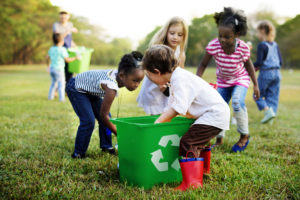
Blog
An Ocean of Possibility if We Allow for It
Just over three years ago, industry leaders from companies including Clorox, Coca-Cola, Colgate-Palmolive and P&G boarded the Resolute for the Oceans Plastic Leadership Summit, an expedition out to one of the world’s five major ocean gyres, where currents trap a swirl of plastic debris.
The three days spent snorkeling among the litter and cleaning beaches near the North Atlantic Gyre must have been devastating. Not just to see their bleached-out logos peppered across the heaps of trash, but to see packaging that was designed to be recycled end its lifecycle as pollution.
The pandemic has left the world changed and in many cases revolutionized, but our waste crisis has stayed adrift. It is not right. It is solvable. But it’s only solvable if every single stakeholder starts taking responsibility, from the CPG industry to waste haulers to legislators. If we want real solutions, we need to stop with the ineffectual finger-pointing, villains of convenience and bad legislative proposals that ignore the realities of a broken recycling system and come together ready to own our respective share of what it will take to achieve progress.
It is not right. It is solvable. But only if every single stakeholder starts taking responsibility, from the CPG industry to waste haulers to legislators.
The CPG industry has meaningfully stepped up with meaningful commitments to recyclable, compostable packaging and using recycled content. But it’s far from enough. The only way it will ever be enough is if we look holistically at the failings of our recycling system and work collaboratively toward common goals with every stakeholder.
China’s National Sword policy rocked recycling and the system has been reeling ever since. But years afterward we can’t accept that one nation’s decision marks the effective end of recycling. Rather it is a much-needed opportunity to reset and rethink America’s recycling system. Recycling in the United States was born piecemeal — city by city, county by county. It shouldn’t die that way. But across the country, local systems are quietly reducing the items they will accept and eliminating curbside collection.
This is an unacceptable outcome. Most Americans have very little awareness that the items they faithfully place at the curb each week may be headed to the very same destination as the trash in the adjacent bin.
But what if, rather than the slow-motion disaster of allowing recycling to deteriorate, we threw out the existing rules and designed a system that works?
What if, rather than unique rules for thousands of systems that invite confusion and result in contamination, we had uniform standards? The same recycling rules for everyone would make it possible for CPG companies to educate Americans on how to properly recycle containers right on the package — something impossible to label for now, as it would require thousands of unique labels for each product. It could mean an industry-wide consumer education campaign that would make a real difference.
What if Americans were no longer confused and could cut down on contamination so more recyclable materials actually get recycled? Whether that material becomes new packaging, furniture or even fuel via chemical recycling, it gets a second chance at life.
What if we thought about recreating the recycling system through the lens of what’s possible rather than getting mired in what’s impossible? Technology is improving, environmental concern is rising and companies are open to solutions. There will be a cost — significant and not yet determined — but rather than trying to band-aid a broken system, why not pay for something sensible and enduring, something that would be environmentally sound and yield the post-consumer recycled content that the market is lacking now?
If not now, when? We cannot stand idly by. We also cannot stand alone. Our industry owns packaging design. We can make it lighter and more efficient. We can use more recycled material. We can label it with clear instructions of how to recycle it if we get uniform standards. And we can help pay for a functioning system.
There are, however, several essential things CPG can’t do. We can’t run the recycling system. We can’t go into Americans’ homes to ensure they are recycling properly. We can’t streamline the patchwork of local rules. But those who can must.
It’s a rare privilege to be part of a defining moment. The chance to save the recycling system and solve for packaging waste ending up in the wrong place is ours. Let’s go do it.
Published on June 17, 2022





